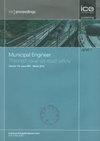Comparative study of sustainable drainage systems for refugee camps stormwater management
IF 0.8
4区 工程技术
Q4 ENGINEERING, CIVIL
Proceedings of the Institution of Civil Engineers-Municipal Engineer
Pub Date : 2018-08-15
DOI:10.1680/JMUEN.17.00019
引用次数: 5
Abstract
To meet the United Nations 2030 Sustainable Development Goals (SDGs 2030) without leaving vulnerable people such as the refugees and internally displaced persons (IDPs) behind, it is important to upgrade drainage systems across refugee and IDP camps using innovative technologies such as sustainable drainage systems (SuDS). Retrofitting the existing surface water drainage systems using SuDS technologies can improve the living conditions of the refugees by addressing environmental challenges such as flooding, erosion and outbreak of water-related diseases across the camps. In this paper, evaluation of pollutant removal and hydraulic performance of laboratory experimental set-up of SuDS technologies mimicking stormwater management conditions for African IDP and refugee camps is presented. Two rigs of engineered wetlands and two rigs of filter drains (FDs) constructed using locally sourced low-cost sustainable materials were evaluated for stormwater attenuation and pollutants removal efficacies. The results showed that both the engineered wetland systems and FDs for simulated refugee camp conditions showed a significant reduction in the organic loading levels for chemical oxygen demand, biochemical/biological oxygen demand and turbidity and nutrients present in the stormwater. In addition, the engineered wetlands and FDs are effective in attenuating significant proportion of precipitation.难民营雨水管理可持续排水系统的比较研究
为了实现联合国2030年可持续发展目标(SDGs 2030),同时不让难民和国内流离失所者等弱势群体掉队,必须使用可持续排水系统(SuDS)等创新技术升级难民营和国内流离失所者的排水系统。利用SuDS技术改造现有的地表水排水系统,可以通过解决整个难民营的洪水、侵蚀和与水有关的疾病爆发等环境挑战,改善难民的生活条件。本文介绍了模拟非洲境内流离失所者和难民营雨水管理条件的SuDS技术的实验室实验装置的污染物去除和水力性能的评估。我们评估了两个工程湿地和两个使用本地低成本可持续材料建造的滤水渠(FDs)的雨水衰减和污染物去除效果。结果表明,工程湿地系统和模拟难民营条件的FDs都显著降低了雨水中化学需氧量、生化/生物需氧量以及浊度和营养物质的有机负荷水平。此外,人工湿地和人工湿地对显著比例的降水有衰减作用。
本文章由计算机程序翻译,如有差异,请以英文原文为准。
求助全文
约1分钟内获得全文
求助全文
来源期刊
CiteScore
3.70
自引率
0.00%
发文量
15
审稿时长
>12 weeks
期刊介绍:
Municipal Engineer publishes international peer reviewed research, best practice, case study and project papers reports. The journal proudly enjoys an international readership and actively encourages international Panel members and authors. The journal covers the effect of civil engineering on local community such as technical issues, political interface and community participation, the sustainability agenda, cultural context, and the key dimensions of procurement, management and finance. This also includes public services, utilities, and transport. Research needs to be transferable and of interest to a wide international audience. Please ensure that municipal aspects are considered in all submissions. We are happy to consider research papers/reviews/briefing articles.

 求助内容:
求助内容: 应助结果提醒方式:
应助结果提醒方式:


